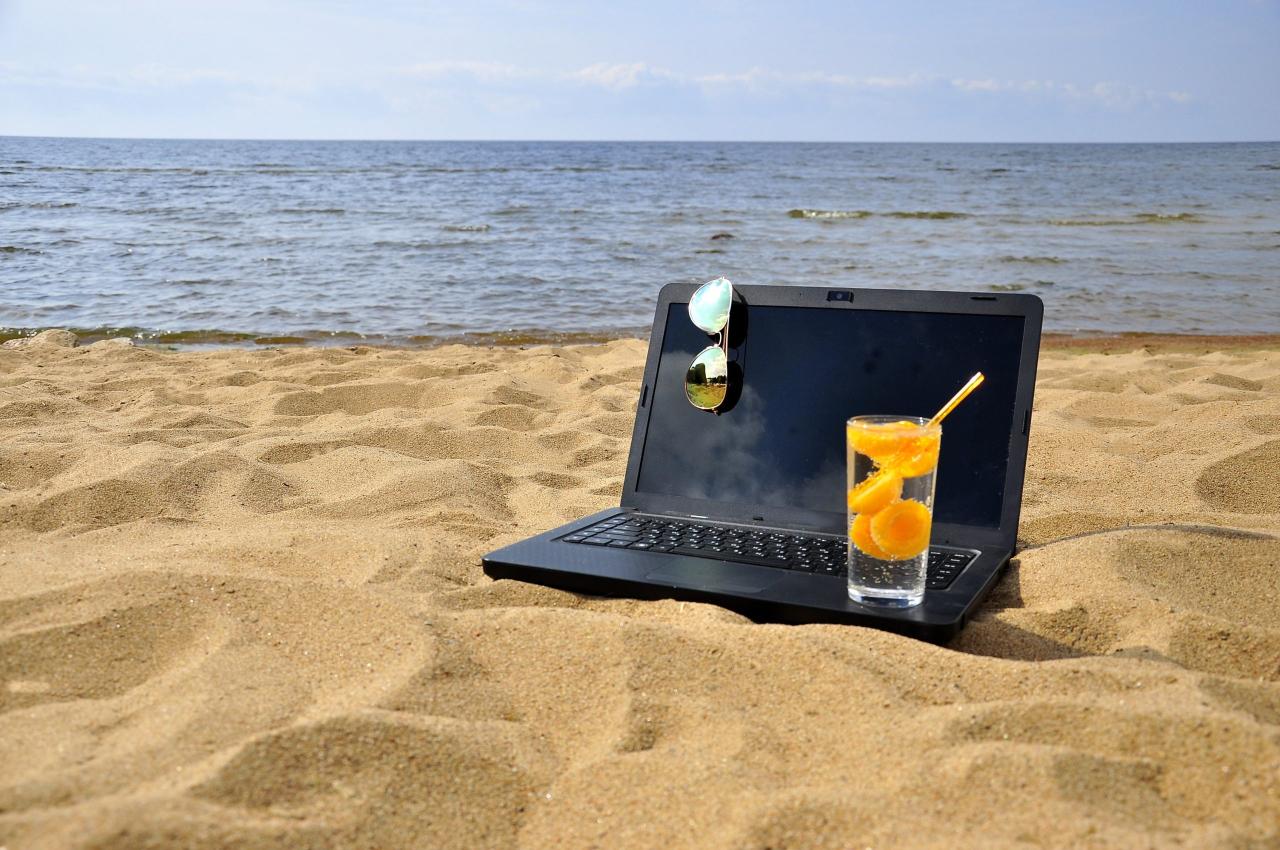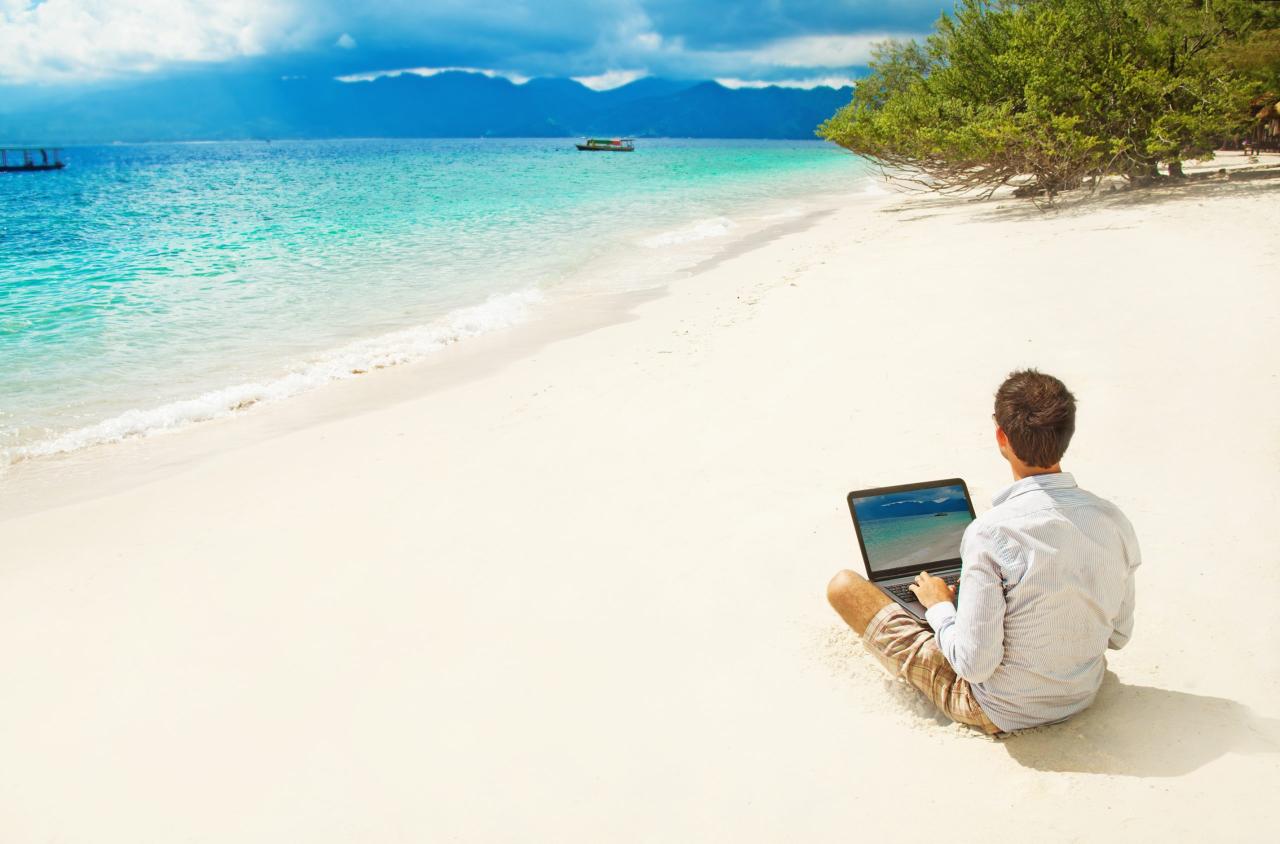The Allure of Remote Productivity

For decades, the concept of “work” was inextricably linked to a physical office. Commutes, cubicles, and fixed schedules were the norm. “Vacation,” conversely, meant a complete disconnect, often accompanied by a stack of emails upon return. The advent of high-speed internet, cloud-based tools, and, significantly, the global shift towards remote work models catalyzed by recent events, has shattered these traditional boundaries.
The workation is a direct response to this evolution. It’s not just about working remotely; it’s about intentionally choosing an inspiring, often picturesque, location to perform your professional duties while simultaneously immersing yourself in a new environment, exploring local culture, and enjoying leisure activities. It’s about optimizing productivity by leveraging a change of scenery, fresh perspectives, and the invigorating spirit of travel, all without sacrificing career progression. This innovative blend offers a powerful antidote to burnout, fostering creativity, and providing a dynamic platform for both professional output and personal enrichment. It’s an acknowledgment that well-being directly impacts performance, and that work doesn’t have to be confined to a dull, uninspiring setting.
Why Workation Spots are Experiencing a Global Boom
Several powerful and interconnected factors are fueling the rapid rise and widespread adoption of workation culture:
A. Global Remote Work Adoption:
The most significant catalyst is the widespread acceptance and implementation of remote and hybrid work models by companies worldwide. What was once a perk is now a standard operating procedure for many organizations, freeing employees from geographical constraints and enabling them to work from virtually anywhere with a stable internet connection. This fundamental shift has opened the floodgates for location-independent work. The flexibility offered by companies, from startups to large corporations, means that employees are no longer tied to a physical desk, allowing them to explore different environments while remaining fully engaged in their careers. This global acceptance has legitimized the concept of working outside traditional office settings.
B. Increased Desire for Work-Life Balance and Flexibility:
Modern professionals are actively seeking greater autonomy and flexibility in their lives. The rigid 9-to-5 office structure is increasingly seen as restrictive. Workations offer a compelling solution, allowing individuals to integrate leisure and travel into their work routine, reducing stress and enhancing overall quality of life without taking extensive time off. It’s about merging personal aspirations with professional demands. This proactive approach to managing stress and preventing burnout is a key driver, as employees realize that a refreshed mind is a productive mind, making these trips less of a luxury and more of a necessity for sustained well-being.
C. Advancements in Digital Connectivity and Tools:
The ubiquity of high-speed internet, reliable Wi-Fi, cloud-based collaboration platforms (e.g., Slack, Asana, Google Workspace), and video conferencing tools (e.g., Zoom, Microsoft Teams) has made seamless remote work a reality. These technological foundations ensure that professionals can maintain productivity and communication regardless of their physical location, making workations feasible even in relatively remote settings. The reliability of these tools means that a workation doesn’t have to compromise project deadlines or team communication, creating a seamless transition from one workspace to another.
D. Reduced Commute Stress and Urban Overheads:
For many, escaping the daily commute and the high cost of living in major urban centers is a significant draw. Workations offer a chance to experience life in more affordable, less stressful environments, potentially leading to better mental health and financial savings in the long run. This provides a compelling alternative to traditional city living. The financial relief from lower rent, cheaper food, and reduced transportation costs can be substantial, allowing individuals to extend their stays and deepen their experience in a new locale.
E. Search for Inspiration and Creativity:
A change of scenery and exposure to new cultures can stimulate creativity, foster new ideas, and break through mental blocks. Workations provide a fresh perspective that can reignite passion for work and lead to innovative solutions, making work feel less like a chore and more like an exploration. The brain thrives on novelty, and a workation provides a constant stream of new sensory inputs, which can significantly boost creative thinking and problem-solving abilities.
The Diverse Ecosystem of Workation Spots
The concept of a “workation spot” is incredibly broad, encompassing a variety of environments tailored to different preferences and professional needs. These diverse options mean that there’s a workation destination for almost anyone, regardless of their work style, budget, or desired leisure activities.
Types of Popular Workation Environments
A. Co-working/Co-living Spaces:
These purpose-built facilities combine shared office spaces (with high-speed internet, meeting rooms, ergonomic furniture) with communal living arrangements (private or shared rooms). They foster a strong community among digital nomads and workationers, offering networking opportunities, workshops, and organized social events. Many provide structured environments with reliable infrastructure, mitigating the common challenges of remote work.
- Appeal: Ideal for solo travelers, those seeking community, structure, and ready-made professional infrastructure. They’re excellent for meeting like-minded individuals, collaborating on projects, and accessing shared amenities like kitchens, laundry, and social areas.
- Examples: Major global brands like Selina and Outsite offer extensive networks of these spaces in popular destinations. Locally run co-living spaces can be found thriving in hubs like Bali (Indonesia), Lisbon (Portugal), and Medellin (Colombia), each with its unique vibe and community focus.
B. Boutique Hotels and Resorts with Remote Work Packages:
Many traditional hotels and resorts are adapting by offering special “workation packages.” These often include enhanced Wi-Fi, dedicated in-room workspaces, access to business centers, flexible check-out times, and sometimes even discounted long-stay rates or meal plans. They are transforming their business models to cater to this new market.
- Appeal: For those seeking comfort, privacy, and resort amenities (pools, spas, restaurants) alongside robust work facilities. This option often appeals to professionals looking for a more luxurious experience with all services provided, minimizing logistical concerns.
- Examples: High-end chain hotels and independent luxury properties in renowned vacation destinations such as the Maldives, the Caribbean, or the European countryside are increasingly tailoring their offerings to remote workers. They might provide soundproof rooms, high-bandwidth internet specific to business use, and access to printing facilities.
C. Vacation Rentals (Airbnb, Vrbo) with Dedicated Workspace:
Private vacation rentals equipped with reliable internet, a proper desk and chair, and a quiet environment are highly sought after. Filters on booking platforms now specifically allow users to search for “dedicated workspace.” This provides a home-like atmosphere for extended stays.
- Appeal: Offers privacy, a “home away from home” feel, ample space for families or groups, and often access to fully equipped kitchens for self-catering, which can significantly reduce food costs and cater to specific dietary needs.
- Examples: Any apartment, villa, or house listed on Airbnb or Vrbo that has been specifically optimized and marketed to remote workers, often showcasing high-speed internet scores and ergonomic setups in their listings.
D. Rural Retreats and Nature Escapes:
These locations offer a tranquil environment away from urban bustle, often surrounded by nature (mountains, forests, lakes, coastal areas). They emphasize peace, fresh air, and opportunities for outdoor activities after work. The quietude and natural beauty are often ideal for deep focus and rejuvenation.
- Appeal: Ideal for those seeking quiet, inspiration, and a strong connection to nature to balance work. This option is perfect for individuals who want to minimize distractions and maximize their time outdoors, whether it’s hiking, birdwatching, or simply enjoying serene landscapes.
- Examples: Remote cabins in the Canadian Rockies, eco-lodges in the Amazon, rural guesthouses in Tuscany, or secluded villas in national parks in Europe or North America. Many offer trails directly from the property.
E. Beach Towns and Coastal Destinations:
Combine work with the relaxing ambiance of the beach. Many coastal towns now boast good internet infrastructure and a growing community of remote workers drawn to the sun, sand, and surf. The ability to switch from a productive work session to a swim in the ocean or a sunset stroll is a major draw.
- Appeal: For those who thrive in a relaxed atmosphere, enjoy water sports (surfing, snorkeling, paddleboarding), and benefit from the calming influence of the ocean. The lifestyle is often more laid-back, fostering a sense of perpetual vacation.
- Examples: Canggu (Bali, Indonesia), Taghazout (Morocco), Tulum (Mexico), various coastal spots in Portugal (e.g., Ericeira), and the islands of Thailand are prime examples of thriving beach workation hubs with robust digital infrastructure.
The Multifaceted Benefits of a Successful Workation
Beyond the obvious allure of working from a beautiful location, workations offer a surprising array of advantages for both individuals and, increasingly, for their employers. These benefits contribute to a more holistic and sustainable approach to professional life.
Advantages of Embarking on a Workation
A. Enhanced Productivity and Focus:
A change of scenery can break monotony, reduce distractions found in a home office, and stimulate fresh perspectives, leading to increased creativity, improved problem-solving, and a renewed sense of focus. The novelty of a new environment often boosts engagement and helps individuals tackle tasks with renewed energy, leading to higher quality output.
B. Improved Work-Life Balance:
Workations seamlessly integrate leisure and work, allowing individuals to enjoy cultural experiences, outdoor activities, or simply relax in inspiring surroundings after their work tasks are completed, preventing burnout and promoting overall well-being. This flexible structure gives individuals more control over their schedules, enabling them to pursue personal interests alongside professional obligations, creating a fulfilling synergy.
C. Stress Reduction and Mental Rejuvenation:
Escaping the daily grind, routine commutes, and urban pressures can significantly reduce stress levels. Exposure to nature, new cultural experiences, and a relaxed atmosphere contributes to mental clarity and emotional rejuvenation, combating fatigue and promoting resilience. The mental break provided by a change of environment can dramatically improve mood and reduce the likelihood of long-term stress-related health issues.
D. Personal Growth and Skill Development:
Navigating a new environment, interacting with different cultures, and adapting to new routines fosters adaptability, independence, and cross-cultural communication skills. It can also provide opportunities to learn a new language or hobby in your downtime, broadening personal horizons and building a more well-rounded individual. These experiences cultivate a broader worldview and increase empathy.
E. Cost Savings (Potentially):
Depending on the destination, the cost of living on a workation (especially for longer stays) can be significantly lower than in major metropolitan areas, allowing individuals to save money while enjoying a higher quality of life. For example, a month in a charming town in Southeast Asia or Eastern Europe might cost less than a single week in a major Western city, offering substantial savings on accommodation, food, and entertainment.
Planning Your Ideal Workation

A successful workation requires careful planning to ensure both productivity and enjoyment. It’s about striking the right balance between professional responsibilities and the exploration of a new environment. Neglecting either aspect can lead to frustration or burnout.
Essential Steps for a Successful Workation
A. Communicate with Your Employer/Clients:
This is paramount. Discuss your plans well in advance, ensure your workation aligns with company policy regarding remote work, confirm connectivity requirements, and set clear expectations for availability and deliverables. Transparency builds trust and avoids misunderstandings. Clearly outlining how you’ll maintain productivity and communication is crucial for gaining approval.
B. Choose the Right Destination:
Consider factors like time zone differences (especially for team collaboration), internet reliability, cost of living, safety, local visa requirements for extended stays, and local culture. Select a destination that aligns with your leisure interests and, most importantly, provides a conducive work environment with minimal distractions. Research its stability and infrastructure.
C. Research Internet Connectivity Thoroughly:
Do not compromise on this. This is the single most critical factor for a successful workation. Check reviews specifically mentioning Wi-Fi speed and reliability in your chosen accommodation and potential co-working spaces. Have multiple backup plans (e.g., local SIM card with ample data, a portable Wi-Fi hotspot, or knowledge of cafes with strong Wi-Fi) in case your primary connection fails.
D. Plan Your Workspace:
Whether it’s a dedicated desk in your vacation rental, a co-working space membership, or a quiet corner in a hotel, ensure you have an ergonomic setup and a distraction-free environment for focused work. Consider factors like good lighting, a comfortable chair, and minimizing background noise, especially for video calls. An uncomfortable or chaotic workspace will quickly undermine productivity.
E. Set Clear Work Boundaries:
It’s easy for work to bleed into leisure when you’re in a beautiful place. Establish a clear work schedule (e.g., 9 AM to 5 PM local time) and stick to it rigidly. Dedicate specific hours to work and specific hours to leisure activities and exploration to avoid burnout and ensure you fully experience the “vacation” aspect of your workation. Treat work hours like you would in a traditional office.
F. Pack Smart and Efficiently:
Beyond personal items, ensure you have all necessary work equipment (laptop, chargers, power adapters, external monitor if needed, noise-canceling headphones for focus, comfortable work clothing). Consider portability and weight restrictions, especially if you plan to move between locations. A dedicated “work bag” can help keep everything organized.
G. Budget Carefully:
Factor in all potential expenses: accommodation (longer stays often get discounts), food (eating out vs. cooking), local transport, co-working space fees (if applicable), visa costs (if staying long-term), and leisure activities. While some destinations are cheaper, workations can still become expensive if not planned well. Track your spending to stay on track.
The Future of Work and Travel
The workation trend is not a fleeting fad but a fundamental shift in how we approach productivity and lifestyle. Its influence will continue to grow, reshaping both the travel industry and corporate policies for years to come. This evolution promises a more flexible, human-centric approach to work.
Emerging Trends in Workation Culture
A. “Workation-Friendly” Destination Marketing:
More countries and cities will actively market themselves as ideal workation destinations, offering special visas (e.g., digital nomad visas), tax incentives, and dedicated infrastructure (e.g., guaranteed fast internet rollouts, development of public co-working spaces) to attract remote workers. This competition for “talent tourists” will drive further innovation in destination offerings.
B. Specialized Workation Retreats and Programs:
Beyond basic co-living, curated retreat programs will emerge that combine professional development workshops, networking events, and wellness activities within a workation setting, offering structured growth opportunities alongside leisure. These retreats cater to specific professional niches or personal development goals, providing a holistic and enriching experience.
C. Corporate-Sponsored Workations:
Companies will increasingly offer workation stipends, organized group workations for team building, or expansive “work from anywhere” policies as a highly attractive perk to attract and retain top talent, recognizing the benefits for employee well-being, productivity, and reduced real estate costs. This signals a shift from viewing workations as an employee’s personal choice to a strategic HR tool.
D. Hyper-Personalized Workation Planning Platforms:
AI-powered platforms will emerge to offer highly personalized workation recommendations based on individual work requirements (e.g., specific software needs, client time zones), leisure preferences (e.g., hiking, culinary experiences), budget, desired social connectivity, and even personality types, making workation planning effortless and tailored.
E. Focus on “Productive Wellness” Ecosystems:
Workation spots will increasingly integrate comprehensive wellness services (e.g., on-site gyms, healthy dining options, meditation spaces, direct nature access, mental health support) directly into their work infrastructure, creating holistic environments that support both productivity and well-being simultaneously. The goal is to maximize both output and personal rejuvenation.
Conclusion
The rapid rise of workation spots gaining popularity globally is not merely a passing trend; it’s a testament to a fundamental reshaping of our relationship with work, travel, and personal well-being. The traditional boundaries between professional life and leisure are dissolving, replaced by a dynamic paradigm where productivity and exploration can coexist harmoniously and symbiotically.
By embracing the workation, professionals are not just changing their geographical location; they are actively investing in their mental health, fueling their creativity, expanding their horizons, and redefining what it means to lead a fulfilling life. As technology continues to empower flexibility and the desire for balance intensifies, the world will truly become our office, inviting everyone to discover the profound benefits of working from a place that inspires both mind and spirit. So, where will your next productive adventure take you?













